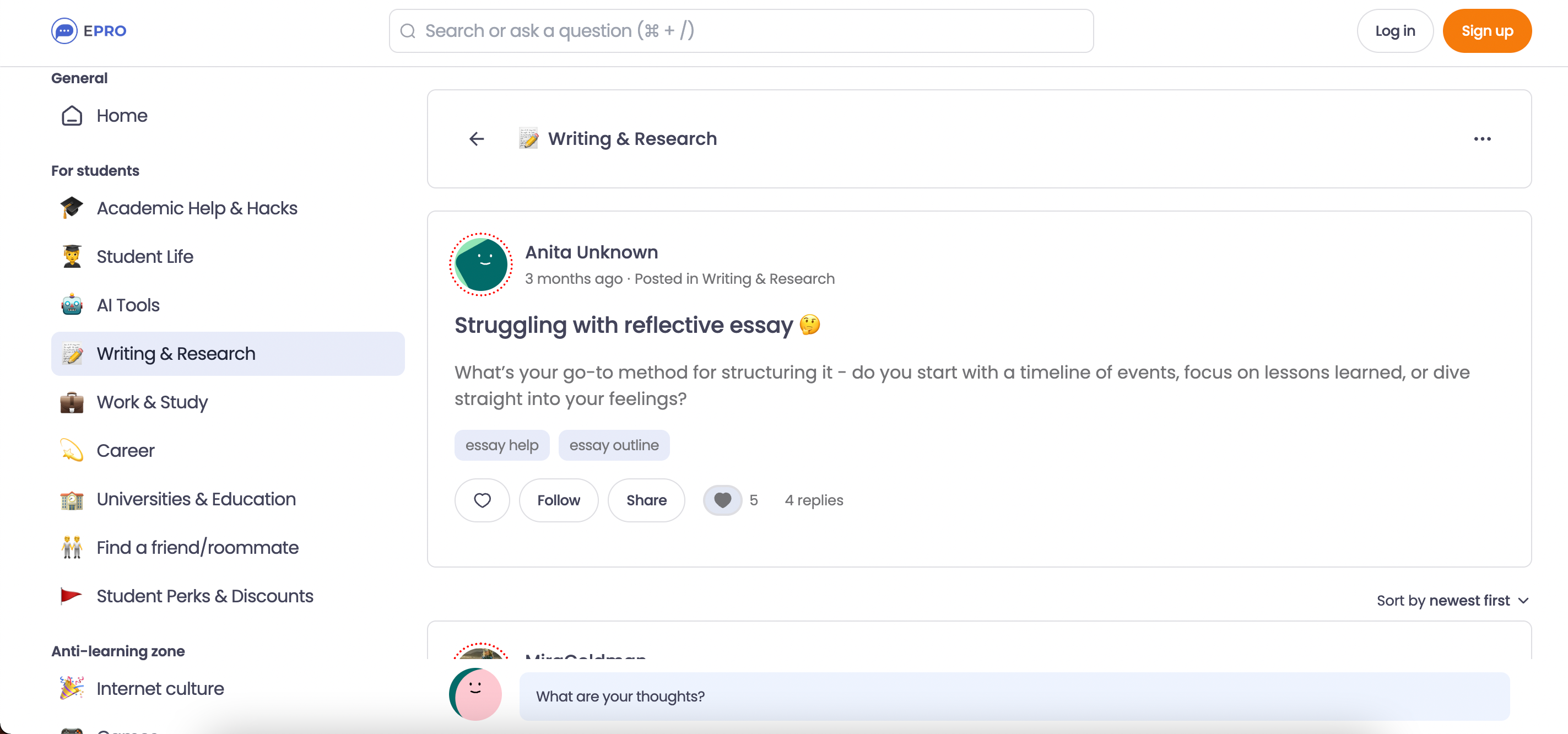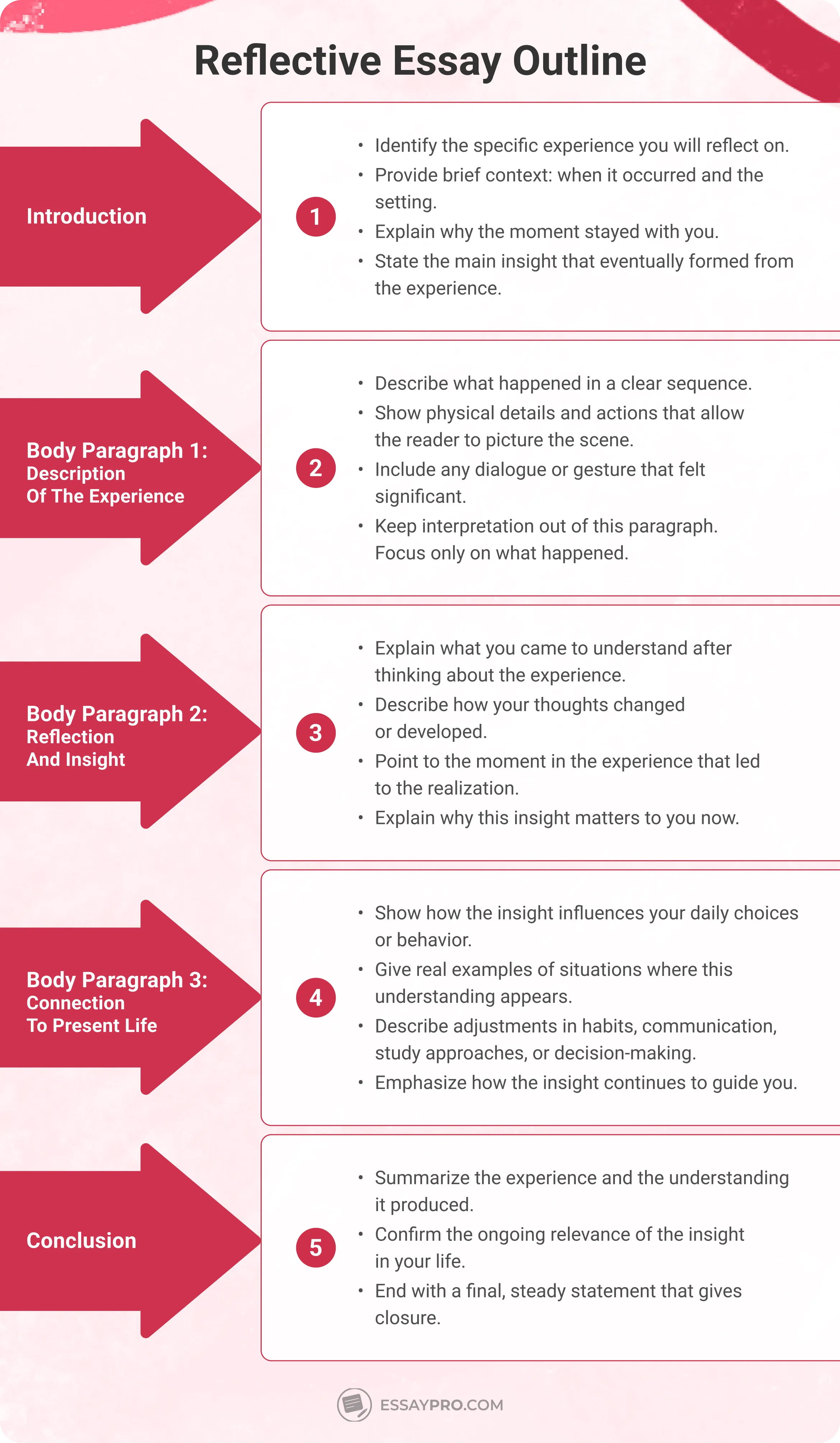Key Takeaways
- A reflective essay centers on one meaningful experience and shows how it influenced your thinking. The event, the insight, and the present-day connection work together as one clear line of thought.
- Specific detail matters. You need to describe what happened in concrete terms before explaining what the moment revealed. Reflection comes after the scene is understood.
- Growth should appear in everyday actions. Show how the insight influences how you carry yourself now. Even small adjustments count.
- A simple structure keeps the writing focused: introduction → description → insight → connection → conclusion.
A reflective essay is a piece that describes a specific experience and how it's connected to personal growth. The writer tells about what happened and then shows the meaning that developed. The key when writing a reflective essay is for the reader to always know how different parts of the story support the reflection.
This article brings together three reflective essay examples for students and instructions on how to write this type of paper. If the drafting process still doesn't come easily to you, simply rely on EssayPro as a trustworthy essay writing service.
What Is a Reflective Essay?
A reflective essay is a written account of a personal experience and its analysis. The writer begins with a specific situation that, in hindsight, caused a change in thinking. The purpose of a reflective essay is to focus on how and why that shift happened. In short, it should describe the event, explain the response, and state the new idea that emerged. The tone remains personal, but since the goal is understanding instead of dramatic storytelling, the essay still needs to remain organized.
Custom writers from EssayPro know how to focus on accurate detail and clear reasoning while still keeping the paper engaging for the reader.
✨ Real Struggles, Real Growth
You’ve learned what a reflective essay is — now see how other students deal with the hard parts of writing one and what they wish they knew before starting.
Jump into our EssayPro Community today and help those in need.

Reflective Essay Outline
The reflective essay format follows a steady and focused structure to keep writing on track. An academic essay of this type benefits from an outline that breaks the process into smaller steps. The outline below helps guide the development of each section when you write a reflective essay.

Introduction
- Present the experience you plan to describe.
- State the central idea or insight connected to the event.
- Provide enough context so the reader understands why this situation matters.
- Indicate the time, setting, or situation so the experience has a clear starting point.
Description of the Experience
- Explain the situation in specific detail.
- Identify the part of the event that influenced your thinking.
- Keep this section factual.
- Focus attention on the moment that shaped the reflection, not background events.
Reflection and Meaning
- Explain what you concluded after the experience.
- Describe how the event changed your future thinking.
- Connect the insight to a broader idea that continues to influence your choices.
- Show how the experience shaped your understanding in a lasting way.
Conclusion
- Restate the main insight.
- Show how this understanding affects your thinking now.
- End with a clear final statement.
- Make the final sentence align with the overall direction of the essay.
How to Write a Reflective Essay in 7 Steps
A clear order helps when you're writing a reflective essay. In short: choose a personal experience → set the context → describe what happened → analyze its meaning → close by showing how the understanding remains with you now.
Let's get into the steps in a bit more detail.
Choose a Specific Experience
Select a clear enough experience to describe in detail. A single situation offers more stability because reflective writing depends on returning to that moment. The experience could involve anything, like school, family, or personal challenge. And the event does not need to be extraordinary, either; it should just have a clear insight you can connect to your present self. Once you choose that particular experience, your essay will gain more focus.
Write the Introduction
The introduction sets the direction for the reflective essay. Start it by stating the event in plain words to give the reader a sense of the situation. Then, explain why that experience stayed in your memory. The introduction should give enough context to show your role in the setting. One or two sentences is usually all it takes to write a brief summary of the idea that you'll eventually develop. Your goal at this point is to write a steady beginning that naturally leads into the experience description.
Example: I walked into the classroom prepared to lead a discussion. I believed planning created control. The moment showed me that listening holds equal weight.
Describe the Experience
Describe what happened clearly. As you move through the moment, keep focus on the surroundings and words spoken. Specific detail builds the scene so the reader has no question about the situation. The sequence should feel natural, as if you were recounting the events to someone who was not there. Readers can follow your thinking more easily when the description remains direct. Do not evaluate or explain meaning in this section because the reflection will handle that part later.
Example: The group sat in a circle. I opened my notebook and asked the first question while everyone else stayed quiet. That silence lasted long enough to feel heavy. When I asked again, one participant began to answer, but I responded too quickly. It was when a careful tone settled over the room.
Reflect on Meaning in the Body Paragraphs
Reflection is the core of creating a reflective essay, which happens in the body paragraphs. This stage explains the understanding that developed through the personal experience you just described. Here, your attention turns toward the thoughts that followed the event. Consider what the situation revealed about your habits, assumptions, or reactions. The reflection must stay connected to the description, and each sentence should show how the experience changed your thinking.
Example: I recognized that I rushed the discussion. I immediately saw how my reaction changed the tone of the room and realized that patience matters more than strict control. The moment changed the way I see leadership and communication.
Connect the Insight to the Present
Now comes the time when you try to make sense of how the insight you gained carries into the present. Understanding should change how you act or communicate. Show how the situation from the past influences ordinary situations in the present. Each sentence should make your growth visible through action instead of general claims. When the insight remains active in your life, the reflection feels more grounded. You should write the explanation in simple language so that everything is easier for the reader to follow.
Example: I now pause before responding. I wait for others to finish their thought. I ask questions that create space instead of pressure. The experience shaped the way I listen.
Write the Conclusion
End the essay by returning to the main insight. The conclusion confirms the understanding you gained from the experience and shows that it still remains part of your thinking. This section does not add new events or new ideas. Your focus only rests on the meaning that you have already discussed in the body paragraphs. A clear final statement helps the reader feel that the reflection has reached its point.
Example: The experience shifted my approach to communication because it taught me to slow down and listen. The lesson still continues to shape how I lead and collaborate. I return to that moment each time I feel myself rushing.
Review and Revise
Review the full essay after the draft is complete and make sure each section leads naturally into the next. The description, the reflection, and the insight need to form one continuous line of thought. With careful revision, you can be sure you did not make any grammatical mistakes or that you didn't include anything that distracts from the main point. Reading the essay aloud also often reveals sentences that feel uneven or uncertain.
Reflective Essay Checklist
Whenever you write a reflective essay and want to make sure you got everything right, reading through the checklist will be useful. This way, you'll see if you have met all the criteria.


Reflective Essay Examples
Real examples will tell you even more about writing than a description of the writing process. Take a look at each reflective essay sample in PDF below:
Reflective Essay Example #1
Notice how the story unfolds in a clear order. The personal experience is introduced first, then shown through simple actions without explanation. The insight comes only after the reader understands the situation, which makes the insight feel more natural. The later lines show how the understanding continues in daily life. The ending returns to the main lesson and closes smoothly. The tone also remains direct throughout the whole text.
Reflective Essay Example #2
Notice how the writing focuses on physical detail to make the experience feel real. The keyboard, the window, the sheets of music, and the repeated hand movements create a clear setting. The frustration is shown through action and sensation rather than explanation. The writer shows growth in realistic changes, not dramatic claims. The pacing remains slow and steady, mirroring the message about patience.
Reflective Essay Example #3
Pay attention to how the writer uses sensory details to set the mood better. Soft lighting and stillness create a calm atmosphere that matches the realization of presence and patience. Growth appears in small shifts in daily behavior, which keeps the insight believable and grounded in lived experience.
Check out some definition essay examples while you're at it. This type of paper is less rooted in personal experiences because it focuses on clearly explaining a complicated concept.
Additional Tips for Writing a Reflective Essay
A personal essay feels natural when you approach the writing process with attention and care. The tips below will help you when you sit down to write your reflective essay and want the ideas to feel grounded:
- Choose a meaningful personal experience: A smaller moment often provides clearer detail than a broad life period. When the event is focused, you can describe it with more accuracy.
- Describe what happened in simple detail. Show where you were, who was involved, and what took place. The reader should be able to picture the setting.
- Let your emotional response appear through observations. Signs like hesitation, tension, or relief can show how the moment felt. Subtle expressions often feel more truthful and relatable.
- Pause before writing the reflection. Give yourself a moment to think about what the experience revealed. The insight should feel connected to the event instead of being added as an afterthought.
- Show how understanding influences your daily behavior. Mention a habit, request, or action that changed. Real-life follow-through makes the reflection feel lived and meaningful. Even small adjustments demonstrate growth.
- Read the entire essay aloud. This will make it easier for you to notice uneven pacing. The essay should sound steady from beginning to end.
Final Thoughts on Reflective Writing
A reflective essay feels strongest when the story leads naturally into the insight, and the insight continues into the present. The main thing is that personal writing should show genuine thought, not rely on dramatic claims.
If the structure or direction still feels unclear after reading our blog, you can always choose to buy an essay online from EssayPro.
FAQs
How Long Should a Reflective Essay Be?
A reflective essay is usually between 500 and 1,000 words, depending on the guidelines of the academic assignment.
What Are the Parts of a Typical Reflective Essay?
The parts of a reflective essay include an introduction, a description of the experience, an explanation of the insight, a connection to current life, and a conclusion.
How to Start a Reflective Essay?
Start by identifying the experience in plain language. Give a sense of time, place, and your role in the moment. Explain gently why the experience stayed with you. This creates direction and prepares the reader for the reflection that follows.
How Do You Write a Reflective Essay?
Write in a steady order that mirrors how the moment unfolded in your memory. Describe the event, then move into the understanding that developed. Show how the insight influences your current outlook or habits. The writing should feel calm and patient.
How to Write a Conclusion for a Reflective Essay?
End by returning to the insight you formed. Describe how it continues to guide your choices or mindset. Keep the tone steady and final. The conclusion should feel like a natural closing point that leaves the reader with a clear sense of completion.

Daniel Parker
is a seasoned educational writer focusing on scholarship guidance, research papers, and various forms of academic essays including reflective and narrative essays. His expertise also extends to detailed case studies. A scholar with a background in English Literature and Education, Daniel’s work on EssayPro blog aims to support students in achieving academic excellence and securing scholarships. His hobbies include reading classic literature and participating in academic forums.
- University of Leeds. (2025). Reflective writing. https://library.leeds.ac.uk/. https://library.leeds.ac.uk/info/14011/writing/113/reflective-writing
- Students. (2025, February 17). Reflective writing. Students. https://www.deakin.edu.au/students/study-support/study-resources/study-support-guides/reflective-writing
- Fallin, L. (n.d.). LibGuides: Reflective writing: Reflective essays. https://library.hull.ac.uk/choose-hull/study-at-hull/library. https://libguides.hull.ac.uk/reflectivewriting/essays







